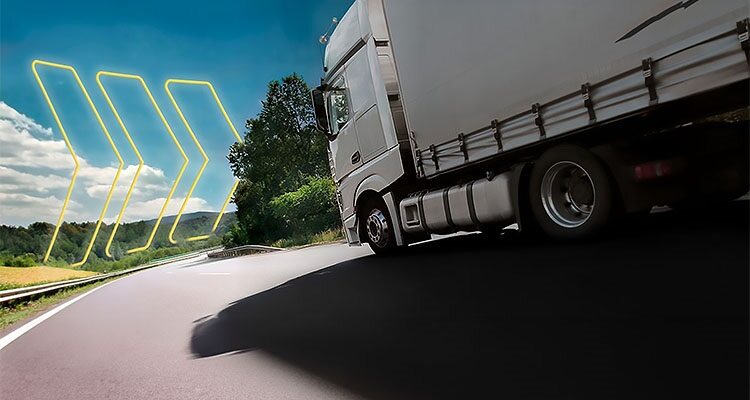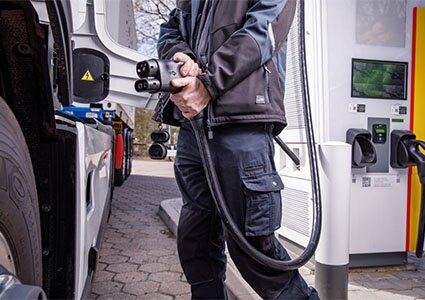
Shell’s General Manager of E-mobility and Global Accounts, Hilmar Van Den Dool, helps fleets take charge of sustainable, profitable and efficient decarbonisation.
Can we start with a brief introduction to you, your career history, and how that led to your current position with Shell Commercial Road Transport?
‘Over the course of my 26-year journey with Shell, I’ve held various commercial leadership roles, spanning fuels retailing, global key account management and launching low-carbon solutions around the world. My experience has taught me the vital importance of collaboration, innovation, and shared learning because, ultimately, we must work together to drive the industry forward. Each chapter has been a building block, and now I’m General Manager of E-mobility and Global Accounts, playing a pivotal role in shaping the future of sustainable fleets.’
Could you provide a little insight into your current role?
‘Absolutely. As General Manager of E-mobility and Global Accounts, I’m at the forefront of supporting fleets throughout their decarbonisation journey. It’s a commitment to making a real impact – a commitment to being a genuine part of something bigger. Collaboration is at the heart of what I do, as I work with customers to enhance their fleet management efficiencies and bring them closer to reaching their sustainability goals. This includes driving Shell’s Accelerate to Zero programme– a consultancy service designed to support fleets in choosing the best course of action and solutions to meet their specific needs. Whether it’s optimising for today or laying the foundation for the future, Shell Commercial Road Transport (CRT) actively develops and deploys fuels and digital services, forges strategic alliances along the value chain, and enhances customers’ fleet management to drive a more sustainable and successful industry.’
Could you give our readers a little detail on Shell Commercial Road Transport’s suite of specialist products and services?

‘As the heavy-duty transport industry continues to evolve, fleets are under pressure to adapt to regulatory shifts, sustainability targets, commercial changes, and the emergence of new technologies. In turn, we are working to address these challenges through a range of solutions. This starts with our global retail network of 46,000 sites and an even larger partner network of 200,000 sites worldwide, which offers customers the fuels and lubricants they need to keep their fleets running smoothly and reliably.
But there’s no use in having these options without convenient access, so our Shell Card offers a gateway to this network, giving businesses a 24/7 solution that covers their fleet’s essentials – from fuels and truck washes to lubricants and more. Meanwhile, fleets can use the Shell Fleet Hub to gain real-time transaction insights and save admin time. Backed by over 60 years of fuel card expertise, it’s designed with integrated fraud detection and prevention to support a secure and hassle-free experience.
When it comes to alternative options, we also provide low-emission energy types like liquified natural gas (LNG), bio-LNG, battery electric charging and hydrogen to support customers with decarbonising their fleets. This wide-ranging mix of solutions is vital, since the idea is always to meet customers wherever they are on their journey, providing advice on the steps they can take today or in the future. Of course, some emissions cannot be avoided or reduced, so we also provide carbon credits to help our customers compensate for these emissions. In combination with carbon reporting and data-driven solutions, this helps our customers build and execute a decarbonisation strategy that works for their fleet, so they can achieve their long-term goals more efficiently.
Finally, tolling also plays a key role in our customers’ decarbonisation journeys. Carbon-dependent tolling, for instance, can help incentivise the adoption of zero-emission trucks and accelerate the transition to cleaner fleets. And, as toll charges become more carbon-focused, governments can create a “carrot-and-stick” effect, encouraging the switch to cleaner options while reflecting the benefits of biofuels. Our own toll payment technology has extensive coverage in Europe, helping streamline the payment process for our customers.
While no organization can address this challenge in isolation, it’s crucial to recognize that there isn’t a singular solution for decarbonizing heavy-duty transport either. The industry increasingly acknowledges the need for a diverse set of solutions. For instance, the International Road Transport Union (IRU) has presented its roadmap for achieving carbon neutrality by 2050. The IRU recommends a combination of energy efficiency measures and alternative fuels to cut 11% more CO2 emissions compared to scenarios heavily reliant on electrification or hydrogen alone. Alternative fuels refer to electricity, hydrogen and biofuels, as well as the public and private infrastructure, vehicles and operational practices needed to use them.
Ultimately, as the industry works together to implement a range of solutions and strategies to move forward, Shell’s overarching goal is to support customers in making the right decisions for all aspects of their business, so that they can navigate today’s challenges and achieve a more sustainable and successful future.’
What benefits have your clients experienced since partnering with Shell Commercial Road Transport?
‘As fleets look to work their way through this complex landscape, our solutions can help them increase their operational efficiency and decarbonise their business. Of course, this includes the various high-quality fuels that make up our portfolio, but it also encompasses a huge ecosystem of digital services and energy solutions. From enabling faster payments through Shell SmartPay to driving fleet efficiencies with the Shell Fleet Hub – between EV technologies and bio-LNG infrastructure – everything in our portfolio is designed to help customers get the most from the breadth and depth of our fleet management network. Shell Fleet Hub is our online card and fleet management portal.
Our work with Kivits Drunen, a logistics provider in the retail sector, is a perfect example, since we integrated everything from the truck technology itself to the power system driving it and the infrastructure supporting its functionality. In collaboration with Shell Recharge, we helped Kivits Drunen install its first EV fast charger at its depot to help future-proof its fleet. This collaboration wasn’t just about embracing the latest technology; it was about understanding the entire value chain and ensuring that each component complements the next. The private charging capabilities introduced as part of this initiative allowed for both overnight and fast charging, addressing concerns related to the transportation of temperature-critical goods across the Netherlands. And, with the addition of 4,000 solar panels installed on the roof of Kivits in Waalwijk, this has reduced the company’s dependency on the local electric grid while contributing to the commitment of making its transport operations more sustainable.
However, we also understand that electrification isn’t yet the answer for every fleet. It’s important, therefore, that the industry is aware of the various transitional solutions that can be used to decarbonise operations in the short-to-mid term. For example, we helped logistics services provider Koeltrans reduce its vehicles’ CO2 emissions by roughly 30% by swapping diesel for bio-LNG. Bio-LNG is a drop-in fuel, helping fleets avoid any expensive infrastructure or vehicle modifications. Shell BioLNG offers up to 100% less CO2 life-cycle emissions, compared to market representative B7 diesel. For these reasons, it is becoming an increasingly important part of the heavy-duty transport’s energy transition, helping to protect operational output while reducing environmental impact.
solutions that can be used to decarbonise operations in the short-to-mid term. For example, we helped logistics services provider Koeltrans reduce its vehicles’ CO2 emissions by roughly 30% by swapping diesel for bio-LNG. Bio-LNG is a drop-in fuel, helping fleets avoid any expensive infrastructure or vehicle modifications. Shell BioLNG offers up to 100% less CO2 life-cycle emissions, compared to market representative B7 diesel. For these reasons, it is becoming an increasingly important part of the heavy-duty transport’s energy transition, helping to protect operational output while reducing environmental impact.
With that being said, many heavy-duty truck fleet managers have been stuck in a holding pattern, wanting to stay ahead of the competition but also not wanting to step forward without certainty. They’ve been held back by concerns around access to fast charging, scalable technology and infrastructure across key transport and freight routes. To provide customers with the confidence that can help them move forward, we’re focused on bringing more electric charging infrastructure to logistics hubs, including ports, airports and logistics parks along key road freight routes across Europe. Our hope is that this will drive a wave of solutions, investments and first movers to make a big impact for the sector.
And, indeed, we’re already seeing this approach pay dividends, as we look to strategically grow our EV networks at logistics hubs and work with customers to provide tailored solutions at their depots. For instance, Shell opened its first public truck charging facility at Georgswerder Bogen in the Port of Hamburg. Consisting of four high-performance charging stations – the facility lets Shell fuel card customers to charge using renewable energies. eDepot charging is a promising development that enables fleets to charge their vehicles overnight using renewable energy resources – allowing drivers to make the most of their time on the road and reduce carbon emissions.
We’ve also established a multi-fuel hub at Eindhoven Acht in the Netherlands. Situated at the heart of the region’s transportation sector, this facility offers a mosaic of solutions, including: 300kW charging bays for renewable energy; Shell BioLNG derived from sustainable biomass; traditional high-quality diesel; and Shell Renewable Diesel. The hub accommodated nearly 40,000 trucks last year alone and is the first in a larger network of Shell hybrid stations along major European freight routes. Our Shell ‘Book and Charge’ system is making it simpler for drivers to reserve charging bays and guarantee charger availability and, therefore, more convenient for them to make the switch to electric.
What are today’s priorities for commercial road transport solutions? What are the challenges facing the sector and how can these be addressed?
‘There are three main challenges for the heavy-duty road transport industry in its journey to a net-zero destination. Firstly, there are 3.5 million road transport companies operating mobility and logistics services. By 2050, the heavy-duty fleet is projected to reach 80 million vehicles worldwide compared to around 45 million today. Decarbonising these vehicles will take a huge amount of energy and innovation. Fragmentation across the transportation sector creates the second challenge. This is due to varying regulation, technologies, fuel solutions, infrastructure and timelines across different markets. That’s a lot to think about for one company, never mind more than 3 million of them. Finally, the industry is highly competitive, meaning there is a constant race to the bottom when it comes to cost.
As a result, the industry finds itself at a crossroads. With the number of heavy-duty vehicles set to nearly double, and the call for lower emissions louder than ever, the industry needs to act – fast. This leaves fleet managers and business owners tasked with balancing sustainable progress with the practicalities of daily operational demands, all while under pressure to control costs and increase efficiency. Acknowledging and addressing these challenges is vital if we want to create an ecosystem of resilient and sustainable fleets. What’s more, with regulations only tightening, fleets need a strategic approach that works with – not against – their wider business goals.
A range of low- and zero-emission options are already available today that can help fleets make this transition, but each is at a different stage of commercial readiness. Therefore, a mosaic of solutions is needed for each step of the decarbonisation journey. A mosaic that must be supported by policy as well as sector collaboration. This, of course, includes the scaling of zero-emissions vehicles, but adopting electric trucks is more than just a vehicle swap; it’s about reliability, efficiency and staying competitive.
Take the example of Shell Recharge and Kivits Drunen installing an EV fast charger – this collaboration was not only about embracing technology but understanding the entire value chain. It shows that businesses need to ask themselves: can this solution grow as my fleet does? Is the hardware the right fit and will it provide efficient monitoring? Can it provide the flexibility I need to schedule charging around my operations? The benefit of choosing solutions that can adapt to evolving operational requirements extends to energy management, balancing power needs, reducing costs, and lowering carbon intensity too.
After all, today’s energy solutions must prioritise scalability to ensure these benefits reach customers. As a result, collaboration will play a critical part in identifying, developing and delivering the right solutions. This means working alongside industry partners and Original Equipment Manufacturers (OEMs) to make sure technologies are fast, reliable and cost-effective. This combination of collaboration and innovation forms the foundation of Shell’s Accelerate to Zero programme. By working with advisors and understanding the possibilities for each site, we can help build a decarbonisation roadmap that allows them to confidently navigate today’s operational, technological and environmental challenges. Because, ultimately, it’s not just about adopting new types of trucks, it’s about ensuring a successful, scalable and sustainable transition.’
For a list of the sources used in this article, please contact the editor.
Hilmar Van Den Dool is General Manager of E-mobility and Global Accounts at Shell Commercial Road Transport. Shell Commercial Road Transport helps to keep heavy-duty fleets on the road by delivering progress at every turn. Its suite of specialist products and services can help drive businesses forward, keeping organizations prepared for today and ready for tomorrow.